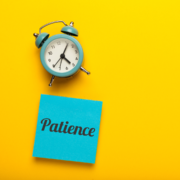Don’t think too much about your investments
As originally appeared in The Jerusalem Post on September 11, 2020.
“Go out there and let it rip and don’t worry about overthinking things and trying to be perfect. Because when you try to be perfect, that’s when you make mistakes.” -Teddy Bridgewater
As the corona pandemic spreads throughout Israel, hundreds of thousands of locals are currently in quarantine (bidud). In Jerusalem, school after school is sending home entire grades as someone tested positive for corona, and now the kids need to go into bidud. Never wanting to miss out on something trendy, we also have a daughter in bidud. Always trying to excel at everything she does, she had to go into bidud because of two different people! And literally, as I write this, my son in 12th grade was just sent home, the whole high school is going into bidud.
While it’s normal to want to be alone occasionally, too much loneliness can lead to over-thinking and depression. What I mean by overthinking is that with all that alone time and little social interaction, a person starts thinking and mulling over all kinds of scenarios that have neither happened nor are rational and are just creations of the mind. Another aspect of the ‘too much thinking’ outcome of being stuck at home is that you can literally drive yourself crazy with all the thinking. I apologize for my pseudo-psychiatry.
I am far from being a mental health professional but dealing with clients and their money, I have seen the negative consequences of overthinking. It’s important to note that this doesn’t just apply to corona times, but I think it’s become exaggerated during the pandemic. I know so many people who currently have way too much time on their hands and spend their days online and watching YouTube videos about investing.
Conceptually, I encourage investors to become more knowledgeable about their finances, but in 2020 when there is information overload, much of it contradictory it can all literally give you a headache. What happens next is that the investor will start second and third, guessing their initial investment plan. That’s not good. As I constantly preach, one of the most important aspects to a secure financial future is picking an investment strategy and sticking with it. Continually switching to a ‘hot’ strategy is, over time, a losing proposition. As Darren Berardi writes in Infolific, “Many beginners have trouble deciding which stock market investing strategy to choose. Often they are even confused about what strategy they are currently implementing. This happens because most people learn about investing from their friends, coworkers and family, together with whatever investing related magazines, newspapers, and web sites they follow. What they wind up with is a hodgepodge of random information to base their investments on rather than a cohesive strategy. The greatest danger in this is that, while most strategies work quite well on their own if implemented properly, they are usually quite disastrous when investors try to combine them.”
There is no ‘best’ investment. What is the best one year may end up being the worst-performing asset the following year. And if you think that you can continuously pick the ‘best’ investment, well, you’re mistaken. No one, not Warren Buffet, not Peter Lynch and not even Aaron Katsman, has the ability to do that.
When investing, keep things simple. Don’t make things more complicated than they should be. It may be fun telling your friends about some complex investment that you made, but too often, that’s the only benefit you will get from all of that complexity. John Bogle, Vanguard founder and preacher of long-term passive investing, gave one of his rules on investing and said, “One of my favorite rules is ‘Don’t peek.’ Don’t let all the noise drown out your common sense and your wisdom. Just try not to pay that much attention, because it will have no effect whatsoever, categorically, on your lifetime investment returns.”
There is no shortcut to building wealth. It may not be as exciting as constantly buying and selling, but dull is good too. The way to build wealth is to buy quality assets and hold them over time. And to continue to, add money to your account whenever possible. By allowing the wonders of compound interest and the growth of the stock market to do their thing, over time, you will create a comfortable nest egg. And you won’t drive yourself crazy.
The information contained in this article reflects the opinion of the author and not necessarily the opinion of Portfolio Resources Group, Inc. or its affiliates.
Aaron Katsman is the author of Retirement GPS: How to Navigate Your Way to A Secure Financial Future with Global Investing. www.gpsinvestor.com; aaron@lighthousecapital.co.il.








